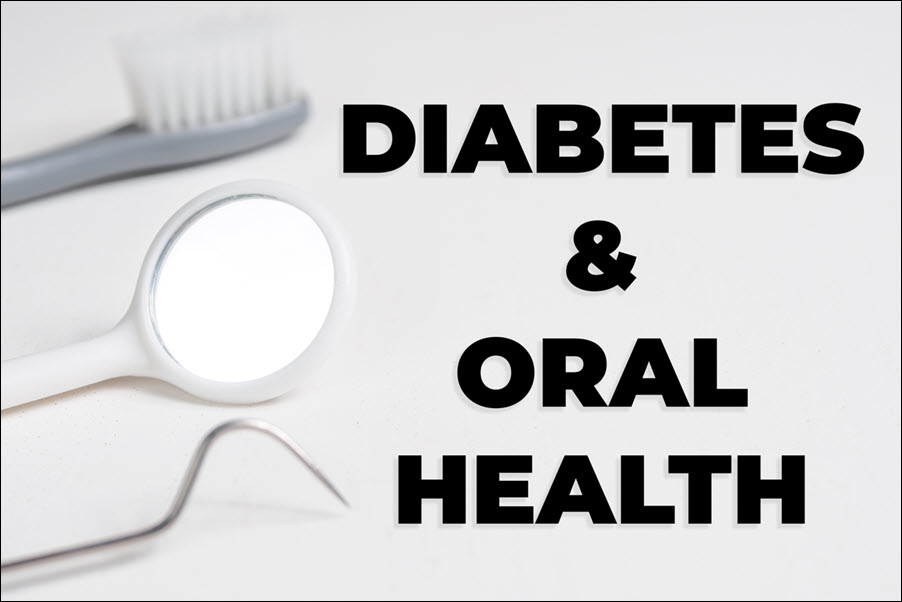Diabetes increases the risk of gum disease, cavities, and dry mouth. High blood sugar levels create an environment where bacteria thrive. Poor blood circulation weakens gum tissue and increases infection risk. Diabetic patients often experience delayed healing and increased tooth sensitivity. Maintaining good oral hygiene protects against these complications and strengthens gum health. Brushing, flossing, and regular dental checkups reduce plaque and gum inflammation. Managing blood sugar levels improves overall dental health and bite strength. Professional cleanings and fluoride treatments protect enamel and reduce sensitivity. Understanding how diabetes affects oral health helps prevent long-term complications. Let’s explore how to protect your teeth and gums while managing diabetes.
How Diabetes Affects Oral Health
 High blood sugar increases plaque formation and bacterial growth. Bacteria feed on sugar, producing acids that weaken enamel and irritate gums. Poor blood circulation reduces the flow of nutrients to gum tissue, increasing sensitivity and infection risk. Diabetic patients experience slower healing, increasing the chance of gum recession and inflammation. Reduced saliva flow increases dry mouth, leading to plaque buildup and tooth decay. Increased plaque hardens into tartar, which irritates gums and increases sensitivity. Gum inflammation increases the risk of gum disease and tooth loss. Proper blood sugar control reduces bacterial activity and plaque formation. Maintaining oral health improves overall diabetic management and comfort. Stronger gums and teeth reduce long-term complications.
High blood sugar increases plaque formation and bacterial growth. Bacteria feed on sugar, producing acids that weaken enamel and irritate gums. Poor blood circulation reduces the flow of nutrients to gum tissue, increasing sensitivity and infection risk. Diabetic patients experience slower healing, increasing the chance of gum recession and inflammation. Reduced saliva flow increases dry mouth, leading to plaque buildup and tooth decay. Increased plaque hardens into tartar, which irritates gums and increases sensitivity. Gum inflammation increases the risk of gum disease and tooth loss. Proper blood sugar control reduces bacterial activity and plaque formation. Maintaining oral health improves overall diabetic management and comfort. Stronger gums and teeth reduce long-term complications.
Brushing and Flossing to Prevent Plaque and Decay
Brushing and flossing daily protect against plaque and cavities. Use a soft-bristled toothbrush and fluoride toothpaste. Brush for at least two minutes, twice a day. Hold the toothbrush at a 45-degree angle to the gumline. Use small, circular motions to clean all tooth surfaces. Floss daily to remove plaque and food particles from between teeth. Clean under the gumline without snapping the floss. Flossing reduces gum inflammation and improves gum attachment. Fluoride toothpaste strengthens enamel and reduces sensitivity. Brushing and flossing protect against gum disease and tooth decay. Stronger enamel and gums improve overall dental health and comfort.
Managing Dry Mouth to Protect Teeth and Gums
Diabetes reduces saliva production, causing dry mouth. Saliva protects enamel by washing away food particles and neutralizing acids. Drink plenty of water throughout the day to increase moisture. Chewing sugar-free gum stimulates saliva flow and protects enamel. Avoid caffeine and alcohol, which dry out the mouth. Use a humidifier at night to improve moisture in the air. Fluoride mouthwash strengthens enamel and reduces plaque buildup. Professional fluoride treatments increase enamel resistance to acid erosion. Saliva substitutes improve mouth moisture and increase comfort. Proper hydration reduces plaque buildup and gum irritation. Managing dry mouth protects teeth from cavities and sensitivity.
Controlling Blood Sugar for Better Oral Health
Stable blood sugar levels improve gum health and reduce infection risk. High blood sugar increases plaque formation and bacterial growth. Monitor blood sugar levels daily to maintain balance. A balanced diet reduces sugar spikes and improves gum health. Avoid sugary snacks and drinks, which increase plaque formation. Eating nutrient-rich foods improves gum strength and healing. Managing stress reduces cortisol levels, improving blood sugar balance. Regular exercise increases circulation and improves gum tissue health. Proper blood sugar control reduces the need for dental treatments. Balanced blood sugar levels strengthen enamel and improve gum attachment. Better overall health increases dental strength and comfort.
Visiting the Dentist Regularly for Professional Care
Regular dental checkups prevent cavities and gum disease. Dentists recommend professional cleanings every three to six months for diabetic patients. Professional fluoride treatments strengthen enamel and reduce plaque formation. Dentists monitor gum health and detect early signs of disease. X-rays identify hidden decay and alignment issues. Scaling and root planing reduce tartar buildup and gum inflammation. Early treatment prevents gum recession and tooth loss. Professional cleanings improve tooth surface smoothness and stain resistance. Proper dental care reduces infection risk and strengthens gums. Regular dental checkups improve long-term oral health and comfort. Professional care increases smile strength and overall dental health.
Avoiding Sugary and Acidic Foods
Sugary and acidic foods increase plaque buildup and tooth decay. Bacteria feed on sugar, producing acids that weaken enamel. Acidic foods soften enamel, increasing sensitivity and plaque formation. Limiting sugary snacks and drinks reduces cavity risk. Eating balanced meals improves gum health and increases enamel strength. Rinsing with water after meals reduces sugar and acid exposure. Avoiding soda, candy, and processed snacks protects tooth surfaces. Fresh fruits, vegetables, and lean proteins strengthen enamel and improve gum health. Better food choices increase tooth durability and reduce plaque buildup. Avoiding harmful foods strengthens enamel and improves bite comfort.
Using Antibacterial Mouthwash to Improve Gum Health
Antibacterial mouthwash reduces plaque and gum inflammation. Rinse with antibacterial mouthwash after brushing and flossing. Mouthwash kills bacteria that cause gum disease and bad breath. Alcohol-free mouthwash prevents dry mouth and increases gum moisture. Fluoride-based mouthwash strengthens enamel and reduces sensitivity. Proper mouthwash use improves breath freshness and plaque resistance. Mouthwash reduces inflammation and improves gum attachment. Swishing for 30 to 60 seconds increases protection against plaque buildup. Better gum health increases tooth stability and chewing strength. Consistent mouthwash use strengthens overall dental health and comfort. Antibacterial mouthwash improves both gum health and breath freshness.
Boosting Confidence with Stronger Teeth and Gums
Proper dental care increases smile strength and confidence. Healthy gums improve tooth stability and bite strength. Reduced plaque buildup increases chewing comfort and reduces sensitivity. Clean, smooth teeth improve breath freshness and smile appearance. Balanced gumlines improve facial symmetry and smile balance. Reduced tooth sensitivity increases comfort while eating and drinking. Stronger enamel increases tooth durability and reduces cavity risk. Healthy gums improve overall facial balance and bite alignment. Better oral health increases confidence in social and professional settings. Stronger teeth and gums increase overall comfort and smile strength. A healthy smile improves both dental health and personal confidence.
Managing oral health improves overall diabetic care and dental strength. Brushing and flossing daily reduce plaque and strengthen enamel. Professional cleanings prevent cavities and improve gum health. Managing blood sugar levels reduces plaque buildup and tooth sensitivity. Fluoride treatments strengthen enamel and reduce acid erosion. Antibacterial mouthwash reduces plaque and improves gum health. Avoiding sugary and acidic foods protects enamel and reduces sensitivity. Proper hydration increases saliva flow and reduces dry mouth. Investing in better oral care improves long-term dental health and comfort. Stronger teeth and healthier gums increase confidence and overall dental strength.

